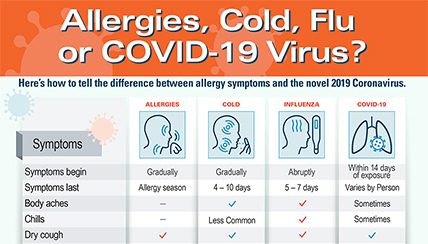The Mystery: Allergies or Cold?
Understanding the difference between allergies and colds is crucial for proper diagnosis and treatment. This article aims to provide a comprehensive guide to help you differentiate between these two conditions. By applying the MECE (Mutually Exclusive, Collectively Exhaustive) Framework, we will explore the causes, symptoms, duration, diagnosis, treatment, prevention strategies, and frequently asked questions related to allergies and colds.

Understanding Allergies and Colds
Allergies and colds share similar symptoms, but they have different underlying causes. Allergies occur when the immune system overreacts to harmless substances, such as pollen, pet dander, or dust mites. On the other hand, colds are caused by viral infections, commonly transmitted through airborne droplets or direct contact with an infected person.
Symptoms and Duration
Allergies
Allergies often manifest as sneezing, itching, nasal congestion, watery eyes, and a runny nose. These symptoms can persist for weeks or months, depending on the individual’s exposure to allergens. Seasonal allergies, triggered by specific pollens during certain times of the year, differ from perennial allergies, which occur year-round due to indoor allergens like dust mites or pet dander. Histamines, released during an allergic reaction, contribute to the symptoms experienced.
Colds
Colds commonly present symptoms such as a sore throat, coughing, sneezing, nasal congestion, and a runny nose. Unlike allergies, cold symptoms typically last for about a week, with the severity varying from mild to severe. The prevalence of colds often increases during colder months. Weather conditions, such as low humidity, may contribute to the spread of cold viruses.
Diagnosis and Treatment
Allergies
Diagnosing allergies involves medical history evaluation, physical examination, and allergy tests, such as skin prick tests or blood tests. Over-the-counter allergy medications, like antihistamines and nasal sprays, can help alleviate symptoms. In severe cases, immunotherapy, such as allergy shots or sublingual tablets, may be recommended. Lifestyle changes, such as avoiding allergens and keeping the home clean, can also aid in managing allergies.
Colds
Colds are usually diagnosed based on symptoms and medical history. Over-the-counter cold medications, such as decongestants and cough suppressants, can provide temporary relief. Home remedies like drinking fluids, getting plenty of rest, and using saline nasal sprays can also help alleviate cold symptoms. If symptoms worsen or persist for an extended period, it is advisable to seek medical attention.
Prevention Strategies
Allergies
To prevent allergies, it is important to minimize exposure to allergens in the environment. This can be achieved by avoiding outdoor activities during high pollen count times, keeping windows closed to prevent pollen from entering the house, and using air purifiers with HEPA filters. Creating an allergen-free home involves regular cleaning, washing bedding in hot water, and removing carpets or rugs that can harbor allergens. Additionally, managing seasonal allergies can be done by monitoring pollen forecasts and taking appropriate precautions, such as wearing sunglasses to protect the eyes and using nasal irrigation to flush out allergens.
Colds
Practicing good hygiene is key in preventing the spread of colds. This includes washing hands frequently with soap and water, avoiding close contact with individuals who have cold symptoms, and covering the mouth and nose when coughing or sneezing. Boosting the immune system through a healthy lifestyle, including regular exercise, a balanced diet, and adequate sleep, can help reduce the risk of catching a cold. Vaccination against cold-related viruses, such as the flu vaccine, is highly recommended, especially for individuals with weakened immune systems or those at high risk of complications.
Frequently Asked Questions (FAQs)
Are allergies hereditary?
Allergies can have a genetic component, meaning they can be passed down from parents to their children. However, having a family history of allergies does not guarantee that an individual will develop allergies. Environmental factors also play a significant role in triggering allergies.
Can a cold turn into allergies?
No, a cold cannot turn into allergies. Colds are caused by viral infections, while allergies result from an immune system response to allergens. However, it is possible for someone with a cold to experience allergy-like symptoms due to nasal congestion and inflammation.
How can I differentiate between a cold and allergies in children?
Differentiating between a cold and allergies in children can be challenging as the symptoms can overlap. However, some distinguishing factors include the duration of symptoms (colds typically last for about a week, while allergies can persist for longer periods), the presence of fever (common in colds but not allergies), and the seasonality of symptoms (allergies are often triggered by specific allergens during certain times of the year).
Are there any natural remedies for allergies or colds?
There are several natural remedies that may help alleviate symptoms of allergies and colds. For allergies, options include using saline nasal rinses, consuming local honey to potentially reduce sensitivity to pollen, and incorporating anti-inflammatory foods into the diet, such as turmeric and ginger. For colds, remedies like drinking warm liquids, such as herbal teas or broths, using steam inhalation with essential oils, and getting plenty of rest can provide relief. However, it is important to consult with a healthcare professional before trying any natural remedies.
Can allergies or colds lead to complications?
In some cases, allergies or colds can lead to complications. Allergies can trigger asthma attacks or cause sinus infections. Cold viruses can also lead to secondary bacterial infections, such as sinusitis or bronchitis. Individuals with weakened immune systems or pre-existing respiratory conditions are at a higher risk of experiencing complications. It is important to seek medical attention if symptoms worsen or persist.
Conclusion
Understanding the differences between allergies and colds is essential for accurate diagnosis and effective treatment. By recognizing the distinct symptoms, duration, and underlying causes, individuals can seek appropriate medical advice and implement preventive measures. Whether it’s managing allergies through lifestyle changes or relieving cold symptoms with over-the-counter medications, taking proactive steps and seeking professional guidance can help individuals maintain their well-being and alleviate discomfort.




